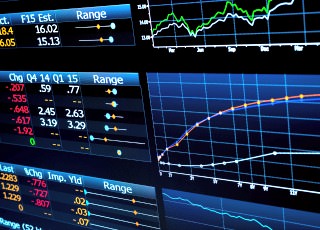Commodity futures trading is not a get-rich-quick scheme
In commodity futures trading, you can make a substantial amount of money and you can become rich in the process, but it isn't a get-rich-quick scheme that you take substantial risk gambling on potential winning trades that could risk your entire net worth....unless you want it to be.
 The same is true for almost any type of investment. While you might think that savings accounts are safe, the truth is, you can lose even investing in them. Rather than losing money, if you invest for any significant length of time, you lose buying power to inflation. Anyone old enough to remember McDonald's first $0.15 hamburger understands exactly what inflation does to buying power.
The same is true for almost any type of investment. While you might think that savings accounts are safe, the truth is, you can lose even investing in them. Rather than losing money, if you invest for any significant length of time, you lose buying power to inflation. Anyone old enough to remember McDonald's first $0.15 hamburger understands exactly what inflation does to buying power.
Commodity futures trading education
Commodity futures trading as with all investments, education and prudent transactions can produce a comfortable income and prevent massive losses. Just as the name indicates, commodity futures trading is speculating on the price of a commodity in the future. While you never actually buy soybeans, if you thought the price of soybeans was going to skyrocket, you'd buy a futures contract. If you thought it would drop, you'd sell a contract.
Some people predict the movement on the price of commodities based on charts and graphs, which is called technical analysis. Others use the fundamentals, such as supply and demand. The information used can include everything from potentially damaging weather conditions to public opinion about the underlying asset. You can use a wide variety of information when doing commodities futures trading.
Commercial trading vs. non-commercial speculating
People who invest in soybean futures in a conservative manner are farmers who actually back the contracts with their own produce and protect their crop prices. Farmers are hedgers, protecting their assets. Since they own the underlying asset, they're considered commercial traders. Those who don't own the asset are non-commercial traders who may or may not be speculators hoping to make profit quickly and risk the potential loss of all their capital in a trade.
Naked trading has its risks
In this case, the term naked refers to writing a call contract for an underlying asset that he or she doesn't own or doesn't own enough to cover the call. A call is an option that one that obligates the seller to sell the underlying asset at a specified price on a specified day but the buyer of the contract is not obligated to purchase it.
If the strike price, the agreed price, is $10 and the underlying asset drops to $5, the purchaser of the call won't want to spend $10 for the asset, but if the price increases to $50, you can bet the purchaser will be waiting for delivery of an asset the writer doesn't own. That can lead to a significant loss to the writer.
Start with education and conservative trades
Commodity futures trading doesn't have to be any riskier than any other type of investment with a larger potential for gain, such as stocks if you take the time to learn. You can invest in options that limit your risk to the small amount of money spent, but ones that you can research thoroughly, such as the movement of the S&P 500. The amount of risk you take is up to you
Related articles
Trading signal service for you!
Guide to futures markets
Research and analysis tools